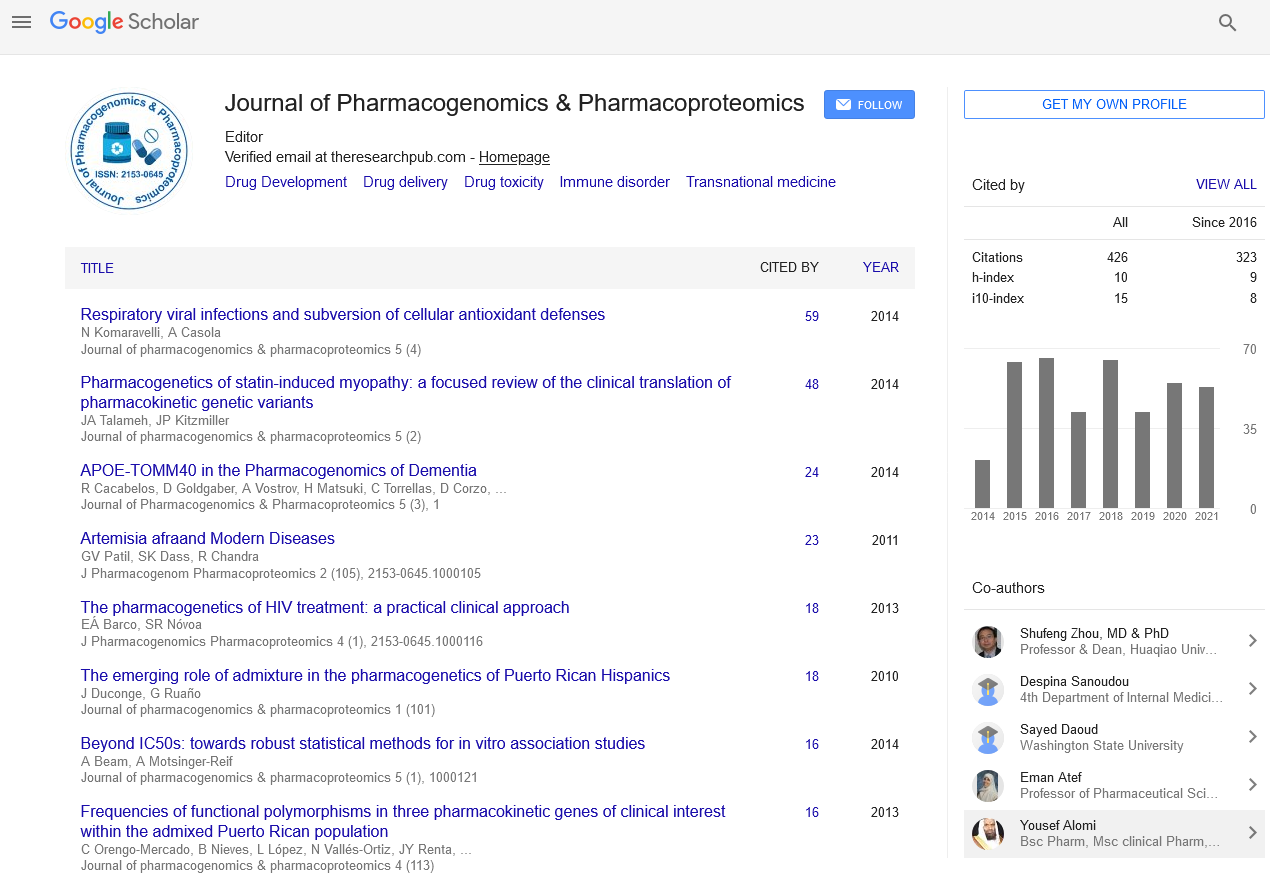Indexed In
- Open J Gate
- Genamics JournalSeek
- Academic Keys
- JournalTOCs
- ResearchBible
- Electronic Journals Library
- RefSeek
- Hamdard University
- EBSCO A-Z
- OCLC- WorldCat
- Proquest Summons
- SWB online catalog
- Virtual Library of Biology (vifabio)
- Publons
- MIAR
- Euro Pub
- Google Scholar
Useful Links
Share This Page
Journal Flyer

Open Access Journals
- Agri and Aquaculture
- Biochemistry
- Bioinformatics & Systems Biology
- Business & Management
- Chemistry
- Clinical Sciences
- Engineering
- Food & Nutrition
- General Science
- Genetics & Molecular Biology
- Immunology & Microbiology
- Medical Sciences
- Neuroscience & Psychology
- Nursing & Health Care
- Pharmaceutical Sciences
Replication of associations of two polymorphisms with survival times in colorectal cancer
2nd International Conference on Predictive, Preventive and Personalized Medicine & Molecular Diagnostics
November 03-05, 2014 Embassy Suites Las Vegas, USA
Sevtap Savas, Jingxiong Xu, Salem Werdyani, Konstantin Shestopaloff, Elizabeth Dicks, Patrick Parfrey, Roger Green and Wei Xu
Scientific Tracks Abstracts: J Pharmacogenomics Pharmacoproteomics
Abstract:
Identification of genetic markers (e.g. inherited genetic polymorphisms) that can predict the survival outcomes in cancer patients is a hot research topic. Published studies reported a number of genetic polymorphisms associated with disease outcomes in colorectal cancer. In this study, we aimed to replicate the associations of 103 single nucleotide polymorphisms (SNPs) with overall survival (OS) and disease free survival (DFS) in a cohort of colorectal cancer patients from Newfoundland. Patient cohort consisted of 505 Caucasian and unrelated patients recruited to the Newfoundland Colorectal Cancer Registry (NFCCR). The genotype data for 103 polymorphisms (or their proxies) were previously obtained using the Illumina? Omni1- Quad platform. The appropriate genetic model for each SNP was estimated using a previously published approach. For OS and DFS, at least one genetic model was estimated for 63 and 79 polymorphisms, respectively. These polymorphisms were then investigated under their genetic models by univariate Cox regression method. Our results demonstrated that one polymorphism in OS analysis and two polymorphisms in DFS analysis were associated with the risk of outcomes at the significance level of p<0.005. When adjusted for other known prognostic factors, association of two polymorphisms with DFS remained significant. These SNPs are located in two genes; one coding for an immune system protein and another coding for an RNA helicase.
Biography :
Sevtap Savas obtained her PhD in Molecular Biology and Genetics in 1999 from the Bogazici University, Turkey. She trained as a Post-doctoral fellow or Research Associate in Louisiana State University (USA), Mount Sinai Hospital Research Institute (Canada) and Princess Margaret Hospital/Ontario Cancer Institute (Canada). Since 2008 she has been an Assistant Professor at Discipline of Genetics, Memorial University of Newfoundland (Canada). Her research program currently focuses on genetic prognostic studies in colorectal cancer using genetic, epidemiological, biostatistical and computational approaches and development of public databases. She serves as a reviewer, academic editor or editorial board member for several journals.


